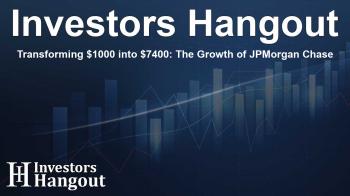Transforming $1000 into $7400: The Growth of JPMorgan Chase

Investing in JPMorgan Chase: A Remarkable Journey
For anyone looking into the power of long-term investments, JPMorgan Chase & Co (NYSE: JPM) offers a compelling narrative. Over the past fifteen years, this financial giant has delivered an annual return averaging 14.59%, exceeding market performance by 2.23% each year. Currently, JPMorgan Chase boasts a remarkable market capitalization of $801.17 billion.
Investment Potential: A Deep Dive
Imagine investing $1000 in JPMorgan Chase stock just fifteen years ago. Today, that initial investment would have blossomed into a staggering $7,438.60, based on the stock price of $291.37 at present. This astonishing growth illustrates the transformative effect of compound interest and prudent investment strategies.
Understanding Compounded Returns
Compounding is often termed the "eighth wonder of the world". To grasp its potential, consider the phenomenon that a small, consistent investment can yield exponential growth over time. The power of compounding lies in not just earning returns on the initial investment but also on the earnings accumulated over time. The implications for an investor are profound, as demonstrated with JPMorgan Chase's consistent performance.
Performance Insights
Looking back, the performance of JPMorgan Chase is commendable. The financial sector has undergone significant changes, yet JPMorgan has maintained its position as a leader. Investors needing a glimpse into the stability and growth potential of their investments will find JPMorgan's history quite encouraging. The company's ability to adapt and thrive amid market fluctuations paints a promising picture for future investors.
The Value of Historical Investment Data
Understanding investment history is crucial for making informed decisions. When reviewing the past 15 years, JPMorgan Chase's data reveals significant trends. Investors who relied on historical performance to guide their decision-making can appreciate the advantages of informed investing.
Future Considerations
As we look forward, potential investors are encouraged to think critically about recent trends in the economy and the financial services sector. What does the future hold for JPMorgan Chase? While past performance is not a guarantee of future returns, the bank’s adaptive strategies and its emphasis on innovation prepare it well for the challenges and opportunities ahead.
Frequently Asked Questions
What is the average annual return of JPMorgan Chase over the last 15 years?
The average annual return for JPMorgan Chase has been 14.59%, outperforming the market by 2.23% each year.
If I invested $1000 in JPMorgan Chase 15 years ago, what would it be worth today?
Today, a $1000 investment in JPMorgan Chase would be valued at approximately $7,438.60.
Why is compounded return important for investors?
Compounded returns are crucial because they demonstrate how both initial investments and the returns accumulated over time can lead to significant growth.
How has JPMorgan Chase maintained its performance?
JPMorgan Chase has maintained its performance through strategic adaptation to market changes and a focus on innovation within the financial services sector.
What should potential investors consider about JPMorgan Chase?
Potential investors should review historical performance, the bank's market strategies, and prevailing economic trends when considering an investment in JPMorgan Chase.
About The Author
Contact Hannah Lewis privately here. Or send an email with ATTN: Hannah Lewis as the subject to contact@investorshangout.com.
About Investors Hangout
Investors Hangout is a leading online stock forum for financial discussion and learning, offering a wide range of free tools and resources. It draws in traders of all levels, who exchange market knowledge, investigate trading tactics, and keep an eye on industry developments in real time. Featuring financial articles, stock message boards, quotes, charts, company profiles, and live news updates. Through cooperative learning and a wealth of informational resources, it helps users from novices creating their first portfolios to experts honing their techniques. Join Investors Hangout today: https://investorshangout.com/
The content of this article is based on factual, publicly available information and does not represent legal, financial, or investment advice. Investors Hangout does not offer financial advice, and the author is not a licensed financial advisor. Consult a qualified advisor before making any financial or investment decisions based on this article. This article should not be considered advice to purchase, sell, or hold any securities or other investments. If any of the material provided here is inaccurate, please contact us for corrections.

